Ah, the Land of the Free! I’ve been dreaming about coming here for so long, but I never expected that I will have such a culture shock in America. You may think you’ll get to know the American life by watching movies and TV shows, but when you actually come here you are in for big surprises!
Table of Contents
The Culture Shock of a European Immigrant in America
I remember my first day in America like it was yesterday. The large arrival area at the LAX airport filled with people from all corners of the world looked so intimidating! There were strangers all around me, each speaking in another language, made feel like I was in a dream. I could hear my pulse in my ears: tic, tic, tic…. I was in finally in Los Angeles, my new home!
Moving from one culture to another is exciting, but it’s also a very stressful experience. Transitioning from your own culture, from everything that is familiar to completely new cultural stimuli will always result in a culture shock.
Culture shock were words that I’ve never heard before or knew the meaning of until coming to California. But to better understand what I mean, I’ll have to give you a little background about my upbringing.
Growing up in a communist country where everything ‘foreign’ or non-communist was banned, I had very little concept of the outside world. The only information about the Western civilization that penetrated the Iron Curtain was either from ‘illegal’ radio stations like BBC, or Voice of America, or from foreign magazines and films that managed to get smuggled into the country.
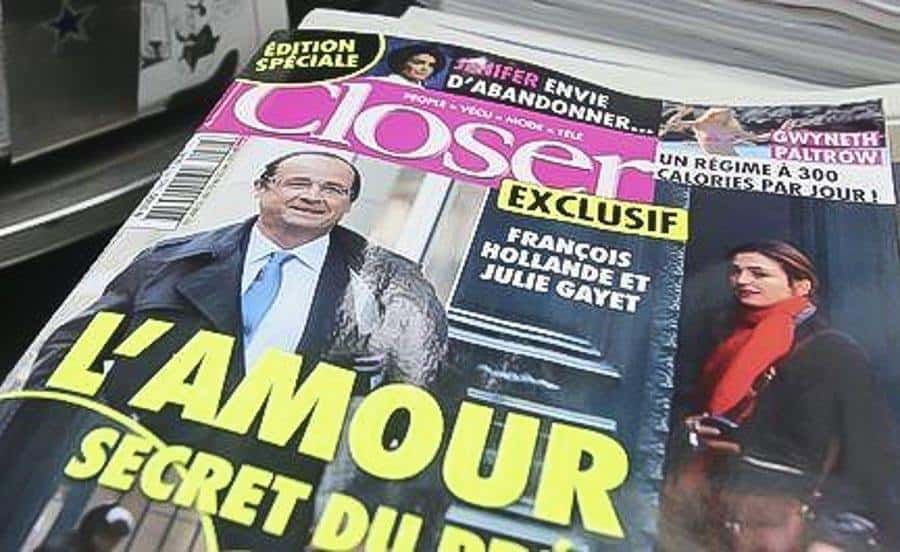
10 Things That Were a Big Culture Shock for Me in America
For me, America was this blessed land of plenty, a place of unparalleled opportunity, where the limit was only my imagination or my willingness to work hard. But moving to America I had a big culture shock and my fair share of surprises.
1. The ‘Fake’ American Smile
Americans have huge smiles on their faces, did you notice that? At first I thought they smile because they are happy. And why wouldn’t they be? Compared to where I came from they lived in Paradise. But then I realized they don’t smile only when they are happy. They actually smile all the time, as if they are plugged in.
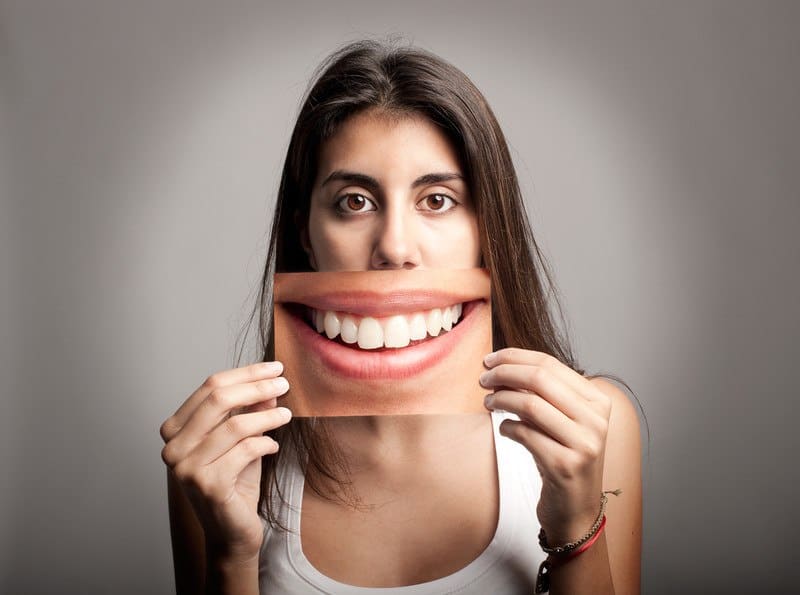
It took me a while to realize that an American smile has very little to do with emotions and a lot to do with being polite.
Smiling the American way of silently greeting a stranger in an elevator, in line at the bank, or in a train compartment. It’s a sign of politeness. Many people consider the American smile fake and insincere, but I’ll take a put-on smile over a sincere frown any day!
2. The Informality
I think informality is a unique American value. For me it was one of the positive cultural shocks in America. Calling your elders, teachers and superiors by their first names was something unheard of in Romanian culture and it still is in most cultures I know.

But the most shocking thing for me was that American informality doesn’t diminish the respect people have for other people. Calling someone by their first name is usually a sign of friendliness or acceptance, not a way to making one feel unimportant.
3. The ‘Heavy’ Weight of the Population
It’s no secret that everything seems to be bigger in America than anywhere else in the world. Streets, buildings, cars, food portions, everything is bigger in America. Unfortunately, that the average weight of the population is also bigger!
When I arrived in California I was shocked by the monstrous proportions of those around me. Coming from a country where food was scarce, I was astound to see people so obese that they could barely walk. Some were men bound to an electric wheelchair to carry them around.

Sadly, obesity is not only condoned in this country, but rigorously defended through anti-discrimination laws.
4. The Shocking Politeness
Americans are shockingly polite: they will hold the door open for those walking behind them, wait patiently in line, excuse themselves for being late, or for bumping into you accidentally. They don’t scream, they don’t yell and they don’t gesticulate. Coming from a culture where people argue loudly and can be very rude, this was a real culture shock!
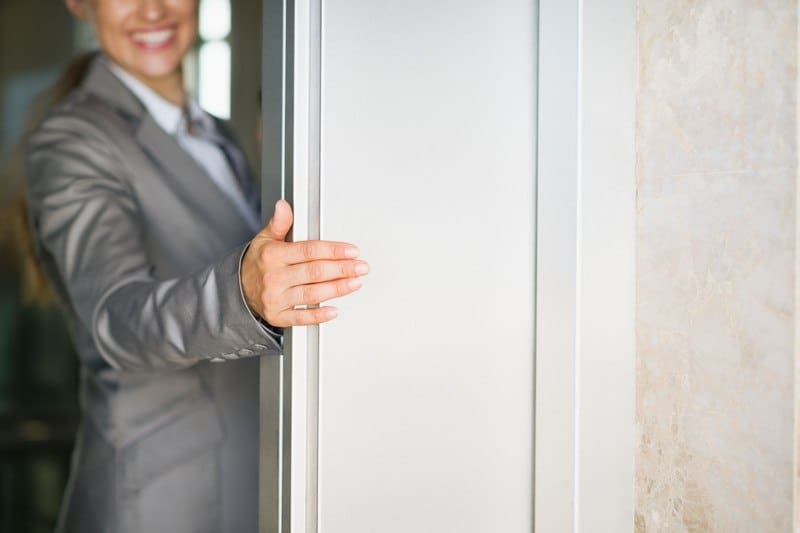
Americans are polite even when they are rude or complain. They can cleverly deliver harsh words in a very polite manner, but generally they try to avoid conflict and confrontation. For me it’s still a very refreshing feeling to hear people say “you are welcome.”
5. The Sense of Personal Space
Americans do not like their personal space invaded. They find it uncomfortable when others stand too close to them and will unconsciously move away.
They don’t hug and kiss each other like the Europeans do. Americans don’t like personal questions and consider it very rude if they are asked about their age, weight, or salary.
They also don’t like to express their emotions. America was built on self-reliance and individualism – the idea that one should only rely on oneself and family in order to succeed. Therefore, they generally avoid getting too close to others.
Americans call everybody a ‘friend’ which makes you feel included, but their idea of friendship is difficult to understand when you come from another culture. What they call a friend, in European culture is rather an acquaintance.
6. The Language Barriers
I was pretty fluent in English when I came to the States, but little did I know that the same word can mean two very different things, depending on what side of the Atlantic you are.
On my first day on the job I asked a colleague for a rubber and in an instant everybody in the office looked at each other and burst into laughter. The innocent pencil eraser – the rubber– as the British call it, is actually a condom in America.

At another time I asked the baker for a couple of buns at a bakery in Los Angeles. The old man behind the counter smiled and handed me the two cakes that I was pointing at, but said softly: “Honey, these are called rolls here. Buns are the ones you are sitting on.”
7. The ‘How Are You’
Perhaps my biggest culture shock in America was the colloquial ‘how are you.’ It took me a long time to realize that when the Americans say ‘how are you‘ they are not actually asking how you are. It doesn’t imply they are interested in your personal life.
How-are-you is just a greeting phrase and it stops right there. So the conversation goes something like this: “How are you? Good, and you? Pretty good! That’s good.”
This style of greeting was really confusing for me. Back in Europe when somebody asks you how you are, they are genuinely interested in knowing if you are well or have some issue you want to share.
8. The American Sense of Humor
When I first moved to the U.S. I used to crack little jokes and make puns, but nobody seemed to be getting them. What was hilarious back in Europe would barely raise an eyebrow in America.

In my turn, I found nothing funny about the “Knock Knock” kind of jokes. Going to standup comedy made me feel totally isolated. Everybody around me was cracking up, but for me their jokes were not funny at all.
While there is a lot of humor that transcends borders, certain kinds of humor is deeply rooted in our nationhood. Many jokes can only be understood in a certain political or cultural context.
9. The Need to Identify a Foreign Accent
One of the things that constituted a big culture shock for me in America was the ‘where-are-you-from‘ question. I didn’t expect that a foreign accent could trigger a whole conversation about your country of origin, politics, family and relatives. Why does a foreign accent immediately invites an inquisition in a country that was built on immigrants?
Even after 30 years I’m still being asked where I am from because of my accent, which is really annoying. For me the where-are-you-from is a loaded question. It assumes foreignness and it disguises curiosity about my ethnic background based on which I can be judged.
If answered sincerely, the question will lead to a series of subsequent questions that are only meant to intrude even further into my personal life. If not answered at all, it will lead to a stiffly and embarrassing silence. It’s a no-win situation!
10. The Respect for the Rule of Law
American people take the rule of law very seriously and are overcautious about what they do or say. My biggest culture shock in America was to discover how easily you can be sued in this country over nothing. If there is a lawsuit to be filed, someone will file it.
When I first saw TV commercials encouraging people to sue their doctors for bad outcomes, which often happen despite the doctors’ best and most competent efforts, I simply couldn’t believe my ears.
No wonder that physicians and nurses in this country spend more time documenting their procedures, than treating the patients themselves!

A Final Note
I must confess that I still have a hard time getting used to some of these things. And yet, the effect of my culture shock in America shaped me up in a good way. It increased my self-confidence and creativity, helped me identify the many different types of people and their values.
And most importantly, it helped me become more acceptant and understanding towards other people. I realized that our differences don’t define us and shouldn’t divide us. There will always be contrasts between cultures, but they shouldn’t affect people’s relationships.
Pin it for later:
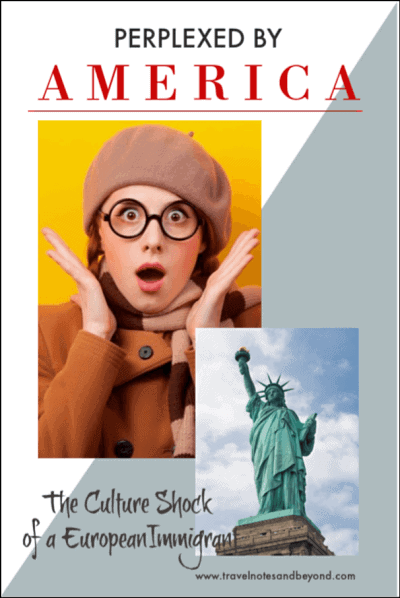

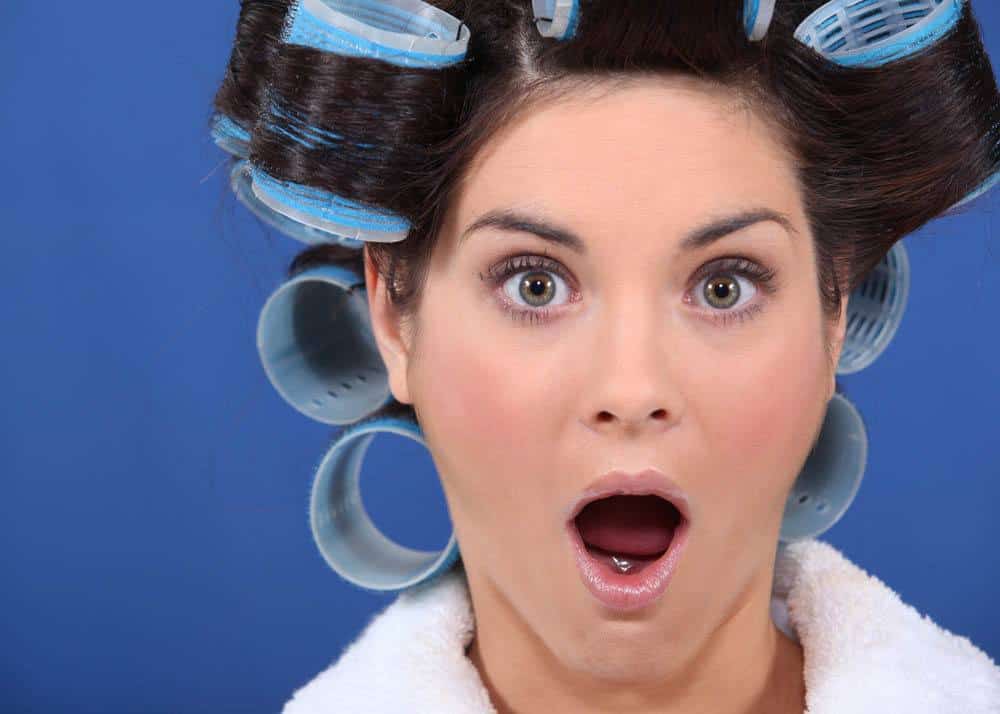


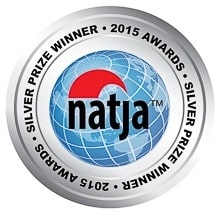

Tm Supportwave
This is really a useful post! Thanks for sharing.
Anda
Glad you liked it.
Michael Thaddeus Doyle
Ugh. You’re those people who move to another region and then complain nonstop that things there are different. If after 30 years you’re still complaining about American culture, the problem isn’t American culture, it’s you.
Anda
You don’t seem to understand what you are reading, Michael! These are not complaints, or criticism, but merely cultural observations. I can assure you that you’d have your own, if you were to move across the world and live in another country. Besides, nowhere in my article do I say that these things still shock me today, after thirty some years.
Mario
I can completely relate with the “Where are you from” question with a twist. I am from the United States. Born and raised with not even a regional accent. I have what can best be described as an American TV accent. I am from Miami and am of Hispanic decent. I have lived in Washington, DC, Washington State, California and now New England. I have been asked where are you from in all of these places. When I tell them Miami the next question is invariably, “No, where are you really from?” I too have no problem differentiating curiosity from derision based on presentation and tone. Unfortunately the problem seems to be getting worse not better.
Anda Galffy
Yea, I know that, Mario. It’s one of those things that I’ll have to live with for the rest of my life, as an immigrant. For you however it must be even more frustrating being asked where you are from.
Suma
I went through the same when I moved to UK to study. Even I was moving around India I felt changes in culture in every city. It’s a great experience to learn something new and also about yourself. Thanks for sharing the detailed information, going to keep these points in mind when I visit the USA in future.
Soraya
ahhhh reading this has brought me back memories of when I moved to Canada for University. Very similar experiences I faced as you! I always remember the “how are you” and for me I thought it was to start conversation but nope, it was more an acknowledgement they know you and a quick way of saying hi. I also do find Americans to be so overly polite to – always big smiles and helpful. I find it so lovely!
Arnav Mathur
I had a similar experience when I moved to the UK for my Masters after living my life in India. While I did not have any major cultural shock per say, but it was a lot of small things, which I figured out every now and then.
Having said that, a lot of my friends did have a major cultural shock. I feel if you keep your mind open without any preconceived notions, the transition will be smooth.
Anda Galffy
Yea, you are right.
Yukti
I loved reading your article as you have listed all the points which only an outsider can only notice when they are landing from a very different place. I too agree that Americans have a Big smile and sometimes I wonder that is this real or trying to prove that they are happy always. The rubber and bun stories are very funny and even in India, we call buns and rubber for eraser many times. But is always great to learn something new from different cultures and I always look forward to it.
Anda Galffy
Yep, you are right.
blair villanueva
Your post is very entertaining to read and I guess I would have the same reaction too if I will visit America. My father’s family side lives all in California, and they share many stories like this. I hope to visit them someday, and share my own cultural shocking experience.
Anda Galffy
Thank you, Blair. Hope you’ll make it to America someday.
ANITA
I can imagine that culture shock, I can really feel you. To be honest, I didnt know that people in US are so strick with rules, I thought the oppostie. It was funny to rad about your language probelms. I also thought I speak english fluently , before I went to England 😀
Leah
I reallly enjoy this post, and it gave me a good laugh! As someone who has lived in the USA my entire life, I always enjoy hearing what other people think of our customs here. I especially got a laugh over your comments on the differences in language. 🙂
Anda Galffy
I’m glad I made you laugh, Leah. I do laugh myself when I remember some of these things that shocked me when I first came here.
Shreya Saha
That’s true. Being on the other side of Atlantic, you will surely be facing cultural shock. There are so much of difference in the UK and US English, and yes, the meaning of many words actually change. The “rubber” incidence was funny though. But at the end, it brought so many positive changes in you, so that’s great.
Jane Dempster-Smith
Hi Anda
Some similarities for me as I went to the UK from Australia. Different meanings for different words. When we moved from Australia to Singapore a completely different culture shock. Certainly makes life interesting.
Gabby
This is a great post! I’m an American who has lived in Europe for a long time and I’ve also written about these cultural differences – people in Europe always ask me why Americans are so fake, and I’m so happy to read that you’ve understood that smiling is just part of the culture, and isn’t done to be fake at all! Speaking of politeness, one of my favorite ways that Americans also take a dig at each other is by telling someone to “have a great day” (somewhat sarcastically) when they have clearly just been rude to you in public. I really enjoyed reading this!
Anda Galffy
Thank you, Gabi. I’m glad you enjoyed my post.
Jorge Barrionuevo
I tottaly agree. I’v been living in the US for 3 years and I still struggle with certain cultural differences with my homeland Chile. I would also say that its probably harder nowadays with the current president.
Anda Galffy
I don’t think cultural differences have anything to do with the country’s leadership.
Emese
Hi, Anda,
Yes, I can totally relate to everything in your post. Cultural shock is very real, and some of it never goes away. I also remember one of my first impression was that everything and everyone is just bigger in America.
Some of my experiences were different because I first landed in New York City. People there aren’t quite as friendly as those on the West Coast. In fact, when my husband (who is American) and I first visited Arizona, we were both blown away by the friendliness of people here. Probably one of the many reasons we fell in love with the place enough to make it our home.
The “Where are you from?” question is a bit difficult to deal with at times. And yes, we can detect if it is genuine interest, in which case it opens a conversation and might even lead to friendships. But some people are totally rude and ignorant. Once someone followed the question with “How long have you lived here?” At the time it has been almost ten years, so I told her, to which the response was “how can you still have an accent after all those years?” Well, if you ever learned a foreign language, you know that unless you learn it as a small child, you might speak it perfectly, but you’ll always have an accent. The question was rude, and the person didn’t even wait for an answer. But most people are happy to speak to someone who grew up in a different country, and their question is genuine and friendly.
Anyway, this was a good read. Thanks for sharing your experience.
Anda Galffy
You are so right about “everything and everyone being just bigger in America,” hahaha!
Amanda Bowers
I hate to hear that you were asked where you are from in a manner that was condescending. I am from the southern US with a very obvious Appalachian mountain accent. One that goes with the stereotype that I don’t wear shoes and am always barefoot and pregnant. Oh, and I don’t have running water. Of course, none of this is true, but when landing in California for the first time last spring, it only took five minutes to be asked. I suppose there are times that people were being condescending, but I figured it was mostly curiosity. This was an interesting article and, I’ll admit, somewhat painful at times to read (though I don’t disagree with much of what you have written).
I only recently read an article about the “rubber” issue between Americans and Europeans. I also read that what we call “pants” is considered “underwear” in some European countries. I suspect there has been many an embarrassed American abroad as well.
I agree with you regarding the informality. We are trying to teach our children to address adults by Mr. and Mrs. but we often have difficulty because their own coaches and teachers will instruct them to call them by their first names. It is something I wish we could get back, but unfortunately, in many cases respect for authority has left our culture. While we are individualists, there was a time when we had respect for an office or an authority, even if we didn’t agree with or like the person in the position. Sadly, those day have left us.
It’s always intriguing to see yourself through someone else’s eyes and certainly instructive! I found your article to be both!
Anda Galffy
I’m with you on the issue of respect for the authority of the office, Amanda. It’s really sad (and frightening!) to see where we’ve come as a nation recently with regards to that.
Vanessa G
The note about humor intrigues me. It had never occurred to me, that which is funny to me can actually not be humorous at all to someone else. New goal: attend one comedy show to the next country I visit
Anda Galffy
After living in the USA for almost 30 years I get even their most subtle humorous jokes now, but in the beginning they left me wondering about the American sense of humor.
Sherri
Hi Ms. Anda Galffy,
I could tell you have an accent just by reading your post! Where are you from?
All jokes aside, I stumbled across this post because I was google searching for an assignment for my sociology class regarding culture shock, ethnocentrism and cultural relativism. Thank you so much for sharing your views and experiences. I was born right here in the U.S. and generally speaking Americans hate to be viewed as doing something “offensive” although generally speaking we do it everyday to people who were born here or born elsewhere in the world. Overall I blame it on ignorance and peoples belief that the world revolves around them.
I really enjoyed reading this post!
Anda Galffy
Thank you for reading my post and thank you for commenting on it, Sherri. You made me smile because after 30 years of living in the USA I consider myself an American, even though I wasn’t born here. I realize I may be over sensitive about the “where-are-you-from” question, but after 30 years of hearing it I began to discern who’s asking it out of pure curiosity and who is not. Glad you enjoyed my post.
Jamie Italiane
Interesting article. Being from California and now living on the east coast, I am proud of people asking about my accent. I still quite feel like a Californian though and I think there is not judgement about that.
Anda Galffy
Bid difference, Jamie! You are being asked about your accent as an American. Of course you don’t feel judged. In your case is obviously pure curiosity. I assure you in my case is not always just that. Believe me, if you were asked that question every time you open your mouth, you’d begin to hate it too.
Nikki
Great article! I found your response to the “Where are you from?” question really interesting. For what it’s worth, Americans ask other Americans that question all the time, too, if they perceive an accent. I was born in North Dakota and lived there until the age of 12, when I moved to Colorado. For a number of years after I moved, I had a very distinct “North Dakota/Minnesota” accent, and I was asked about it all the time. I’ve been in Colorado for 25 years now, and my accent is now more of a Colorado one (which is far more neutral), but when I go to visit North Dakota, people ask me where I’m from because I sound different! I’m sure that some people have a more negative view of immigrants, which is a very sad and ridiculous state of affairs. However, I think that for the bulk of Americans, that is something that is totally ingrained in our small talk. We ask each other that even without accents, and if we meet someone with an accent, we’re genuinely curious. In my mind, I always thought that asking someone where they were from was showing interest in someone and a good way to kick off a conversation. It really never crossed my mind until now that others might consider it rude!
I also thought your comment about friendliness and politeness was interesting. I have found that to be somewhat regional. People on the West Coast are definitely far more polite and laid-back. People on the East Coast, in my personal experience, seem to be a bit more brusque. Sometimes people from the West Coast think that the East Coast folks are rude, but I don’t think it’s meant to be rude, so much as a cultural tendency to just get to the point. And people from the East Coast think that people from the West Coast are too laid back and easily offended. 🙂
Great article — thank you for sharing!!!
Anda Galffy
Thank you for taking the time to write this long comment, Nicki. I really appreciate it.
bettyl-NZ
As an emigrant from the US to New Zealand, I find your thoughts here quite refreshing. I blogged about my own ‘culture shock’ many times on my ‘My Views of New Zealand’ blog, but one post just won’t stay in 2008!
Anda Galffy
I should read some of that stuff, Betty. Sounds very interesting.
Corinne
Anda, Although I agree that the “Where are you from?” question is primarily a conversation-starter, I hate the question, too. As someone who has lived all over, I don’t really associate any as a true home, and just saying “America” or the “USA” is not ever sufficient. So, from a completely different perspective than your own, I still don’t like that question.
Anda Galffy
Yea, I hear you, Corinne. This question tells me that I am perceived as an outsider and that’s not a good feeling. I would rather prefer “where were you born?”
Eileen g
I think one of the reasons why Americans ask, where are you from is that it’s an essential part of your identity. New Yorkers believe they are distinct from Californians, who are distinct from Texans, just as Americans believe they are distinct from French or Chinese (though apparently not Canadians). Also, everyone is from somewhere else, be it another country or another part of the US. So where you come from and how you got where you are is an essential part of your story and everyone has a story. You trade these stories to be polite or break the ice or build trust or to find connections (you’re from Prague? So was my college roommate! You’re from Boston? I went to college there.). Next time someone asks, I suggest you return the question, so you won’t feel it’s only a question for recent newcomers.
Anda Galffy
I think you are wrong Eileen. How often are you being asked where you are from and how upfront? I bet not many times and that’s because most likely you don’t have an accent. Believe me, after 30 years of the “where are you from” question I can clearly tell when the question is condescending.
Anda Galffy
Yea, you may be right. I’m sure there are many regional aspects of life in America that I’m not aware about. I’ve only lived on the West Coast, so I can’t speak much about the rest of the country.
Marianela
I cannot believe what I discovered reading this article. I am an immigrant living in Canada for the past 40 years and all of it , 100% of what the writer says, applies to Canada.
So the question I have now is: What is the cultural difference between the two countries? Not that it matters, but I am just curious and intend to put it down on paper
Anda Galffy
There are definitely some cultural differences between the two countries, but overall they don’t differ that much. I haven’t lived in Canada to be able to tell exactly how different Canadians are from the Americans. However, if you feel you’ve experienced many of these issues I describe in this post, it means they are very similar.
Pinay Flying High
This is so spot on! I was nodding and laughing at everything you’ve mentioned here specially on the “how are you’s”. :p
I once went into a jewelry store there (to buy our wedding ring nonetheless) and the person behind the counter asked me how am I and before I could tell her that I’m doing well, she was already at the store room behind the counters. LOL.
Anda Galffy
Yea, the ‘how are you’ became so embedded in the American culture that nobody even thinks about it as a question anymore. That’s why is so shocking from people coming from another culture.
E
Thank you for posting this! Being an American in Europe I find myself missing all the smiling faces, informality and can now laugh at my weird need for laws/rules. As for the obesity… It’s a sad truth with the exception being that I’m from Los Angeles were there is constant pressure to be “beach body” ready. Being born, raised and living more than 30 years in Los Angeles, I can tell you I got asked “where are you from” all the time and it has to do with my lack of accent. Oh, and I also don’t get the humor.
?
Anda Galffy
Thank you for your comment Eva. I live in L.A. too and I am very aware of the “beach body” pressure, but that may be an issue for the younger generation. Once they pass 30, they don’t seem to care how fat they are, beach or not beach. As for the “where are you from” questions, I can assure you that it has a very different meaning when addressed to people who don’t sound ‘foreign.’
Vlad
Anda, I found this a very interesting read. What I’m curious about is how you feel when you come back to Romania, are there things you’re not accustomed to, or things you find better here? 🙂
Anda Galffy
Thank you for reading this Vlad. I’ve spent most of my adult life in the States, so obviously I no longer feel ‘at home’ when I visit Romania. I like it, because that’s where many of my friends and family are, but I feel a little lost. So many things have changed there lately, that I almost don’t recognize many of the places that were so familiar when I lived there.
Victoria@celebratetheweekend
I too hate the “Where are you from question?” Being asked that more often than not have come to appreciate the rare first moments when i am not asked!!! I agree that it is a privacy intrusion and generates an exchange of personal info i am not always in a mood for!! (the neutral question could be: what language are you speaking? (if curious and hear a foreign language).
Anda Galffy
I’m sure most Americans don’t realize how disparaging this question really is. They may be asking it out of pure curiosity, but the way they come across is by no means as well intended.
Doreen Pendgracs
Wow, Anda. If you think Americans are polite, you’ve got to spend some time exploring Canada! Everyone always comments on how polite and friendly we Canadians are. Especially in Manitoba, where we even have “Welcome to Friendly Manitoba” on our licence plates!
Anda Galffy
Well, maybe I should try to spend some time in Canada then. Do you think the Canadians will ask me where I’m from too?
Cam
Despite the problems America has, one thing that is world class about it is the over-friendliness of many of its people. Many will do their level best to help out a stranger in need!
Jennifer Crites
I, too, am an immigrant to the U.S. — from England. And even though I was a child, I experienced some culture shock, just as you did. Please know that when Americans ask “where are you from?” they are not being rude or trying to put you down for being from somewhere else. It’s a conversation starter (which is why many other questions follow). It can be a way of getting to know you (and for you to know them when they tell you, “Oh, I’ve been there.” That American informality again. I live in Hawaii and am often mistaken by locals for a tourist because I’m white. The first thing they say, when they think I’m a tourist, is, “where are you from.” They’re always surprised when I say, “I’m from Makiki,” a district in Honolulu. It’s just the way people start conversations with other people they don’t know. Great article, by the way. Oh, and I can add one particular surprise my family learned when buying big-ticket items like furniture in the U.S. Don’t pay in full with cash. Once you’ve paid for something and not taken it with you, customer service is non existent. Of course, everybody pays with credit cards now, but back then, my dad was used to paying for what he bought and expecting prompt delivery. Different times.
Anda Galffy
Thank you for your comment, Jennifer. What you say it true, sometimes “where are you from” is a conversation starter. However, in my 30-year experience, I became an expert in detecting when the question is condescending.
Terrilyn Hicks
Interesting Article. Very fun to read. The “how are you?” portion is very funny and very true. Sometimes when people respond by saying good, I will occasionally ask “If you weren’t good would you tell me?” To which most people answer no.
I’m from Texas and notice an accent really quickly. To be honest, I always ask people who have accents where they are from even if I know the accent is American just not from the same state. It seems that other countries have a lot more diversity on a more global scale. I don’t know if other people ask to be condescending but personally, I feel that when living in America, most people I meet are from America. For me, it is an exciting experience to meet someone who has a life and experience to a world that is very different than mine. In school, we learned Texas History, then US History and as a choice were permitted to take Global History which mostly focused on ancient history more than anything. Growing up, we don’t learn very much about other countries in school and really only know about other countries from either going to the country or seeing it in movies and maybe the occasional news broadcast. Personally, I WISH I had an accent and cool story about another country. Maybe it’s ignorance on my part but it does come from a genuine interest in learning about the person.
Anda Galffy
Dear Terrilyn, your sweet comment really touched my heart! I wish I would feel this genuine interest in the ‘where are you from’ question, but believe me, it’s not always the case. Unfortunately, even when it’s pure curiosity, the question becomes irrelevant because it’s not a good start for a constructive conversation. It is unmistakably perceived as a sad reminder that I can’t be assimilated into this culture that I full-heartedly embraced as my own. Don’t get me wrong, I don’t mind the question if diligently asked during the course of a conversation. But in most circumstances, the question pops up after a ‘hello’ or a ‘thank you’ and that’s quite a nuisance.
Jennifer
I completely agree on the “Where are you from?” statement? I am from the United States and my family and I travel quite a bit It is nice to get a “connection” if someone is from where I have been.